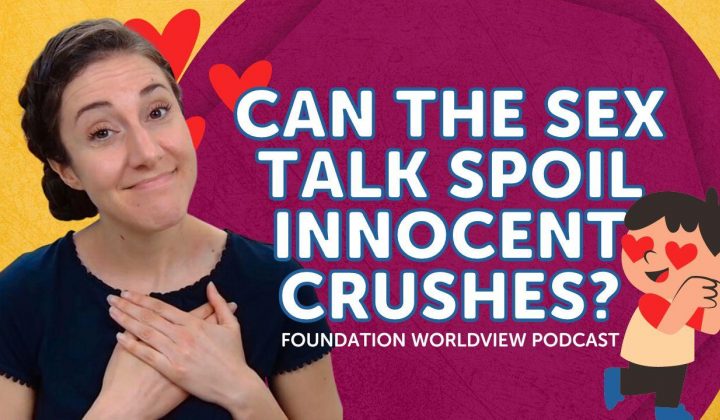Learn more about the journey that led to us equipping kids to carefully evaluate every idea they encounter.
Meet members of our team who have contributed to curriculum development.
Hear from real users of the Foundation Curriculum.
Learn what we believe about God, Jesus, Scripture, and more.
Explaining Words Like ‘Hot’ & ‘Sexy’ to Kids: A Biblical Perspective
Today's podcast question says, "How can I explain to my 8-year-old the words/concepts of "hot" and "sexy" in the framework of God's good gift of sex without introducing perversion?"
Transcript
Note: The following is an auto-transcript of the podcast recording.
Hello, friends. Today's podcast question says, "How can I explain to my 8-year-old the words/concepts of "hot" and "sexy" in the framework of God's good gift of sex without introducing perversion?" Now, this is such an important question because I'm sure many of us are wondering how we can introduce our children to concepts that they will naturally be exposed to in the world while doing so through the lens of a biblical worldview. And that's exactly what we're going to dive down deep into today.
My name is Elizabeth Urbanowicz and I'm the host of the Foundation Worldview Podcast where we seek to answer your questions so that you can equip the children that God has placed in your care to carefully evaluate every idea and understand the truth of the biblical worldview.Now, one thing that I really appreciate about this question is that the questioner got something spot on. The questioner asks how he or she can explain these things through the framework of God's good gift of sex, and that is foundational. Anytime we want to prepare our children for something they are going to encounter in the world regarding gender or sex or sexuality, that the framework for God's good design must already be set. For those of you who have listened to the Foundation Worldview podcast faithfully that we typically recommend that the first of many sex talks be had at the age of three or four, and we have other resources that you can go to explain, hear the explanation of why we recommend this. But one of the main reasons for this is parents want their children to view them as the expert. We don't want our children running off to friends or to Google or to who knows where to find out answers to questions about sex and sexuality.
And the first person that we hear about a topic from, we view that person naturally as the expert. So when we have the first talk with our children about sex and sexuality, when they've never heard of the concept before, they're naturally going to come to us with their questions about the topic. And so we really want that.
We also want to make sure that the first time our children hear about sex, they hear it in a positive context, that it's not just, no, don't do this, this is bad. But wow, look at this amazing gift that God has given us. Now let's look at how God, the designer set up the design for this good gift. And after that, we can talk about corruptions or perversions of that good design. So I really appreciate how the questioner got that spot on that we first need to make sure we have the framework for God's good design.
Now, before we move on, if you found the content of this podcast beneficial, please take the few seconds that it takes to like and subscribe this. Make sure you don't miss any future content. It also just helps us get the word out to more Christian parents and educators and church leaders on how they can ground their kids in a firm understanding of the biblical worldview and carefully evaluate the ideas they encounter.
Now, when we think about the words mentioned in this question, the terms hot and sexy. Now I would argue that these words are not inherently wrong in and of themselves. There are certain words when we think about slurs, racial slurs against a certain group of people, or if we just think of a curse word that's really vile, those are terms that we never, ever, ever want to use ourselves and we never want our children to use where terms such as hot and sexy, they're not in and of themselves perverted or wrong.
However, it would be wrong for our children to use such words now or for our children to have such words used about them. And the reason for that is a child using such terms or a child having such terms used about him or her would really be objectifying that it's just someone looking at someone else as an object solely for sexual pleasure. Now, if a husband looks at his wife or a wife looks at her husband and flirtatious says, wow, you look really hot today, or I'm so glad I have such a sexy spouse, that's not inherently a bad thing. Now there could be cases in which maybe the husband or wife are objectifying one another, and the use of such terms is not a God honoring thing. However, those terms could be used in a way that is appropriate within the covenant of marriage. And so what we want to explain to our kids is first of all, that after we've laid that positive biblical theology for sex and sexuality, then what we want to do is we want to help them understand that they are going to understand that they're going to encounter some deviations from God's good design for sex and sexuality.
Now, in our curriculum, God's Good Design, which is for children for on up, the way that we explain this is in a few different lessons. And in the first lesson, our big truth is that sin corrupts God's good design. And we have the kids practice that saying over and over and over like we do in all of our four plus curriculum. So they practice over and over saying, sin corrupts God's good design. And we explain that corrupt means to ruin or to destroy. And so we can give kids a really simple example. You can have them paint a picture or make something with Play-Doh and then say, okay, now what I want you to do is I want you to ruin or destroy that painting or that Play-Doh animal or whatever it is. And then have them see, okay, what does it mean to ruin or destroy? It means to get rid of it, to make it so that it's not how the artist or the creator intended it. And so then we can make that connection say yes. And this is what sin is. Sin is rebelling against God and it corrupts ruins or destroys God's good design. And we then explain to kids in the God's good design curriculum that there are many ways in which they are going to see sin corrupting God's good design. And sin isn't just out there in the world, sin is here within human hearts because we have inherited Adam's sin and we choose to sin every day. And so then in that curriculum, what we do is we explain several different ways that sin corrupts God's good design. We say because of sin, not all pictures are good pictures because of sin. Not all touch is good touch. And then what I think that we do in that curriculum that could really apply in this situation with these words is teaching children the truth. Because of sin, we often reject or ignore God's good design. So again, because of sin, we often reject or ignore God's good design. Then we can talk about ways that we've seen ourself rejecting or ignoring God's good design. You as the parent can explain, do you remember when I got really frustrated with you the other day when you did this? And then I yelled at you, I was rejecting and ignoring God's good design for me as the parent. I did need to punish you because you sinned, but I should not have punished you out of anger. And you can talk about ways that each of you in the past has rejected or ignored God's good design. And then in this situation, when thinking about words such as hot and sexy, we can discuss with our kids how because of sin, we often do not look at other people as God has commanded us to.
Another important truth for our kids to know that we do cover in that God's Good design curriculum is that humans are created in God's image. And so we often don't treat others as God's image bearers. And sometimes we only focus on how people look and we don't focus on who they are on who God made them to be. And so this is the point after you've talked about sin corrupting God's good design, and because of sin, we often reject or ignore God's good design. And then how because of sin, we often don't look at other people as God's image bearers.
Then you can introduce the words and explain what they mean and then explain why your children should not be using these words now and potentially ever outside of the context of marriage. And so I'll just model for you how you could do this. You could say one of the ways that people choose to reject and ignore God's good design is rather than looking at others as God's image bearers, they just look at how other people look and whether or not they enjoy how other people look. And then you could say, and sometimes the words that people use to describe someone when they think they look really nice is they'll use the word hot and they'll say, oh, that person looks hot. Or they'll use the word sexy to say, oh, that person looks sexy. And those words mean that they enjoy the way that person's body look. And then you can ask, how did God create us? Can you remind me? How did God create us? That's right God in his image. So are our bodies important? Yes, they are. Are our bodies the best thing about us? No, God has created us as whole people. So our bodies are important, but our bodies are not the only or the best thing about us. So should we look at other people and just focus on how they look and whether or not we like that? No, that's not how we should treat others. So we're not going to use the words hot or sexy when we're describing other people. And if you ever hear someone use that word, that's something you can remind yourself in your mind, oh, that is not a good way for us to be talking about another image bearer. And then you can explain. You can say a husband and a wife. God's given a husband and a wife to one another, to love one another. And God has given a husband and a wife the good gift of sex. And husband and wives are supposed to enjoy one another's bodies. So if a husband were to use one of those words with his wife or a wife, were to use one of those words with her husband, it could be okay, but they would just use those words between one another. They probably shouldn't be saying that out loud in front of lots of other people. So you can just explain it that way so that there could potentially be some appropriate context for those words. But those words really aren't ones that we should primarily use to describe people.
Then we also want to make sure that our kids understand that it's not a bad thing to appreciate how someone looks, that it's good to marvel at the beauty of God's creation. When we see a majestic mountain, it's a good thing to marvel and to praise God about it. When we see a beautiful cardinal or bluebird, it's a good thing to marvel at it. When we see someone who has a really pleasant smile, who's just warm and inviting, it's good to marvel at how God created that person. So to explain to our kids it's good that we can enjoy how other people look. And then you can say some things that you appreciate about your kids, like, I really love your deep green eyes, or I really enjoy your curly black hair, or something that you think is very beautiful about your child. So to distinguish, enjoying the beauty of a person and having that point us back to God as the designer versus just calling someone hot or calling someone sexy and placing all the emphasis strictly on their body and how we feel about their body.
Highly recommend to the questioner and to anyone else listening who has a child ages, basically four to eight-ish that you check out our God's Good Design curriculum. Because what we do in that 30 lesson curriculum is going to lay the foundation so that these conversations can just happen naturally. And so your children have a deep, biblically grounded understanding of God's good design for them, God's good design for relationships, God's good design for sex, God's good design for marriage, and God's good design for family. So highly recommend you check that out.
And then as we close our time, I wanted to read a liturgy from this book Every Moment Holy. We recommended it before in our book club. But at the back of this book, Douglas Kaine McKelvey, the author, he has momentary liturgies for practicing the presence of God. And one of the momentary liturgies that he has is called Upon Seeing a Beautiful Person. And so these are liturgies that the author, Douglas Kaine McKelvey, encourages readers to memorize and to say in their minds or out loud anytime they encounter a situation like this. Now, I think this liturgy is probably a little bit too deep for an 8-year-old, so I don't know about having children memorize it, but I think we could as adults memorize it and say it, and then have this just be the attitude of our hearts when we see someone who is physically attractive and then eventually pass that on to our children. So this is the liturgy for upon seeing a beautiful person and it says, Lord, I praise you for divine beauty reflected in the form of this person. Now train my heart so that my response to their beauty would not be twisted downward into envy or desire, but would instead be directed upward in worship of you, their creator, as was your intention for all such beauty before the breaking of the world. And I think this liturgy is just really helpful because it's reminding us that seeing someone who has physical beauty is such an amazing reminder of God's goodness and his creativity and the marvel of his design. But our natural inclination on this side of Genesis three is either to look at that person and be envious of them or to look at that person and to lust after them.
So asking God to transform our hearts and our minds so that when we look at someone who is physically attractive, that our gaze goes upwards and says, wow, God, thank you for beauty. I know that this person is ultimately a reflection of your beauty, and that's what we want to teach our children.
Well, that's a wrap for this episode. But as always, my prayer for you as we leave this time together is that no matter the situation in which you and the children God has placed in your care, find yourselves that you would trust that God is working all things together for your good. By using all things to conform you more into the image of His Son. I'll see you next time.
Related Posts and insights

Can The Sex Talk Spoil Innocent Crushes?
Can having the sex talk with younger children give them ideas that could impact what would normally be an innocent crush? In this episode, Elizabeth Urbanowicz responds to the fears of having the sex talk too early with children and discusses the importance of building a healthy biblical view of others as image bearers of God.

Are Kids Vulnerable When We Protect Them from Pornography?
Today's question says, "By protecting our kids from pornography, are we putting them in danger of being too easily aroused? Most people who consume tons of media today are somewhat desensitized to the porn that pervades all of society. If we hide these things from our kids, do we increase the allure when they finally do see it?"

Teaching Kids About Love In A Culture That Redefines Words
Our culture and the Bible may use the same words like love, but mean completely different things. Parents need to start talking about definitions of words that culture redefines.





